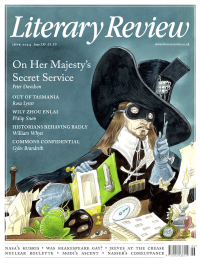Darrin M McMahon
Planet of the Killer Apes
The Invention of Prehistory: Empire, Violence, and Our Obsession with Human Origins
By Stefanos Geroulanos
W W Norton 512pp £22.99
‘There’s something about caves,’ Stefanos Geroulanos observes towards the end of this deft and provocative book. They devour and block out the light, forcing us to listen, to see with our minds. Those musings serve as an introduction to a chapter on the modern discovery of prehistoric cave paintings in such places as Altamira and Lascaux. ‘To experience the caves’, Geroulanos writes, ‘is to situate them in a history of the imagination’, one that takes in the Odyssey, the Oresteia, Plato’s philosophy, the Bible, Nietzsche and, in our own day, a host of bestsellers.
If to imagine is what we must do whenever we think about the past, we must do so especially hard when it comes to those who lived in times for which there are no written records. That is the territory into which The Invention of Prehistory ventures. The book is a study of the narcissistic fantasies that human beings have projected onto the deep past. Prehistory, Geroulanos says, and the ‘obsession’ with human origins that attends its study, has ‘never really been about the past’. It is about the concerns and needs of the present. In tracing the often-disturbing ways that prehistory has been put to work, he uncovers a brutal history of empire, violence and domination.
The book opens in the 18th century, when writers like Jean-Jacques Rousseau fantasised about the state of nature and pondered the growth of humanity through successive stages of development, from barbarism to civilisation. These writers seeded a crucial connection, linking the world’s surviving indigenous peoples to humanity’s first born. Indigenous

Sign Up to our newsletter
Receive free articles, highlights from the archive, news, details of prizes, and much more.@Lit_Review
Follow Literary Review on Twitter
Twitter Feed
Alfred, Lord Tennyson is practically a byword for old-fashioned Victorian grandeur, rarely pictured without a cravat and a serious beard.
Seamus Perry tries to picture him as a younger man.
Seamus Perry - Before the Beard
Seamus Perry: Before the Beard - The Boundless Deep: Young Tennyson, Science, and the Crisis of Belief by Richard Holmes
literaryreview.co.uk
Novelist Muriel Spark had a tongue that could produce both sugar and poison. It’s no surprise, then, that her letters make for a brilliant read.
@claire_harman considers some of the most entertaining.
Claire Harman - Fighting Words
Claire Harman: Fighting Words - The Letters of Muriel Spark, Volume 1: 1944-1963 by Dan Gunn
literaryreview.co.uk
Of all the articles I’ve published in recent years, this is *by far* my favourite.
✍️ On childhood, memory, and the sea - for @Lit_Review :
https://literaryreview.co.uk/flotsam-and-jetsam